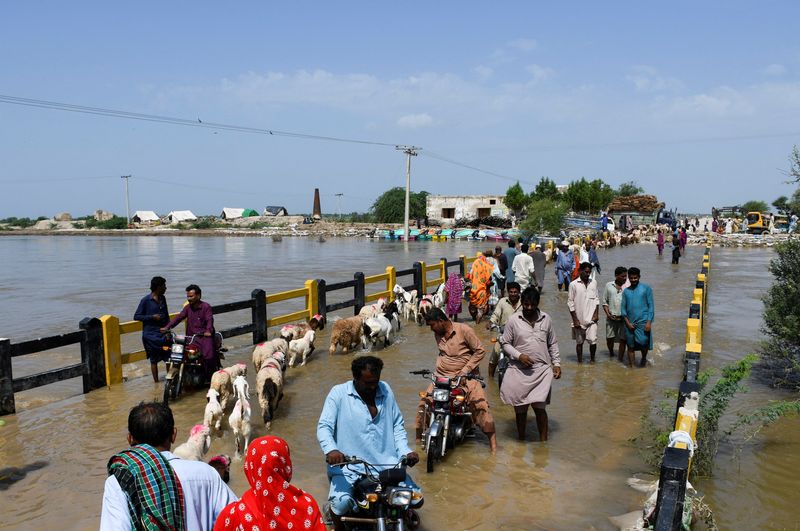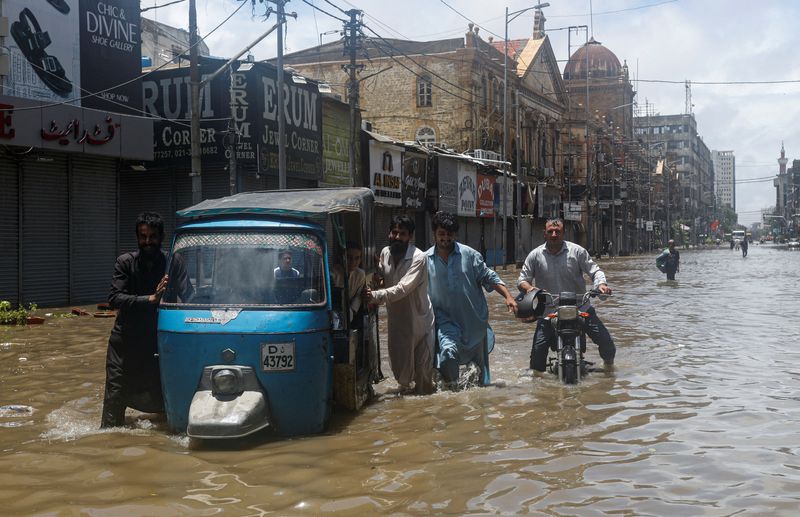By Syed Raza Hassan and Asif Shahzad
SHIKARPUR, Pakistan (Reuters) - Residents in southern Pakistan used sandbags to shield their homes from surging floodwaters that inundated a major highway on Wednesday, as global aid began arriving with food, medicine and tents to help alleviate a major national disaster.
Abnormal heavy monsoon rains and melting glaciers triggered floods that have submerged a third of the country and killed at least 1,191 people, including 399 children. The United Nations has appealed for $160 million to help with what it calls an "unprecedented climate catastrophe".
In Dadu, a district of the southern province of Sindh, residents gathered to form new dikes and reinforce existing ones using sandbags near a major highway that was deluged by water overnight.
"We have been working to make and reinforce this dike since early morning," Damshad Ali, 20, told Reuters, vowing to stay in the flood-stricken area with his family.
Nearby, another man called for help.
"I appeal to all young men to come join the dike strengthening, God willing we will save the city of Mehar from the flood waters," he said from a mound of sandbags, as local residents joined the effort.
FLOODING SET TO WORSEN
Wednesday's flooding was caused by water gushing down from nearby mountains between the provinces of Sindh and Balochistan. Residents feared the situation could worsen as water from flooding in the north had yet to reach the southern province of Sindh and could do so in the coming days.
Global aid began arriving, carrying planeloads of tents, food and medicine from China, Turkey and the United Arab Emirates as the scale of the devastation unfolded, the foreign office said.
Hundreds of thousands of displaced people are in urgent need shelter, food and clean water, with the threat of more flooding to come on Wednesday.
Pakistan has received nearly 190% more rain than the 30-year average in the quarter through August this year, totalling 390.7 mm (15.38 inches). Sindh province, with a population of 50 million, was hardest hit, getting 466% more rain than the 30-year average.
Major rivers, the Indus and the Kabul have reached "high to very high flood" levels that are likely to continue rising over the next 24 hours, the National Disaster Management Authority (NDMA) said.
It said 480,030 displaced persons were transferred to refugee camps.
Foreign Minister Bilawal Bhutto-Zardari accompanied diplomats from 20 countries on a flight over the flooded regions which Climate Change Minister Sherry Rehman said comprised a third of the country.
International aid agencies have asked for a relaxation on imports of food from Pakistan's old rival and neighbour India, Finance Minister Miftah Ismail said.
"It will take a long time to bring the situation under control," Rehman told a news conference, adding that clean drinking water was scarce and "diseases are spreading."
6.4 MILLION IN NEED OF AID
Villager Fayyaz Ali, 27, in Sindh's hard-hit Shikarpur district, managed to get his family to safety but had little hope of saving his small home.
"The house is going to fall at any moment. It's inundated," Ali told Reuters as he sat on higher ground.
Like many others, Ali said he had yet to receive any help.
Main roads running above the fields have become refuges, with people, together with their belongings and farm animals, seeking shelter from the sun and rain under makeshift plastic tenting.
The World Health Organization said over 6.4 million people were in dire need of humanitarian aid.
"Access to health facilities, healthcare workers and essential medicines and medical supplies remain the main health challenges for now," WHO said in a statement.
Some 888 health facilities have been damaged, it added.
Army helicopters have been plucking stranded families from rooftops and patches of dry land and dropping food in inaccessible areas, mainly in northern and southwestern Pakistan.
Colossal volumes of water are pouring into the Indus river, spilling out along its length and leaving vast tracks of land submerged.
Flash floods have swept away homes, businesses, infrastructure and crops. The government says 33 million people, or 15% of the 220 million population, have been affected.
The floods have also washed away standing and stored crops that officials say will likely lead to a food shortage, with prices of edible items surging in a South Asian country already suffering from 24.9% inflation.
General Akhtar Nawaz, chief of the national disaster agency, said more than two million acres (809,371 hectares) of agricultural land have been flooded.
"The rice crop has been washed away," Prime Minister Shehbaz Sharif told reporters after visiting northern Pakistan. "Fruit and vegetables are gone."
He said floodwaters had swept away 700,000 livestock.

Early estimates have put the flood damage at more than $10 billion, the government has said, appealing to the world to help it deal with what it has called a man-made climate catastrophe.
(This story corrects spelling of Mehar in sixth paragraph)
(Reporting and writing by Asif Shahzad and Charlotte Greenfield in Islamabad; Editing by Robert Birsel, Tomasz Janowski and Bernadette Baum)
